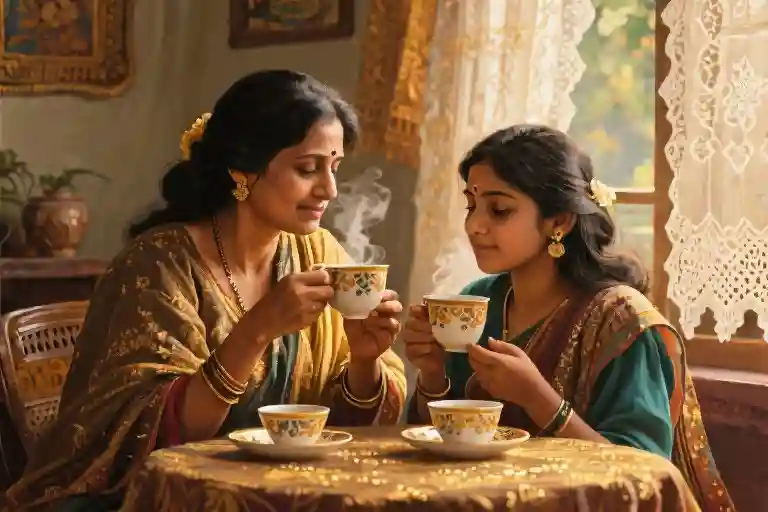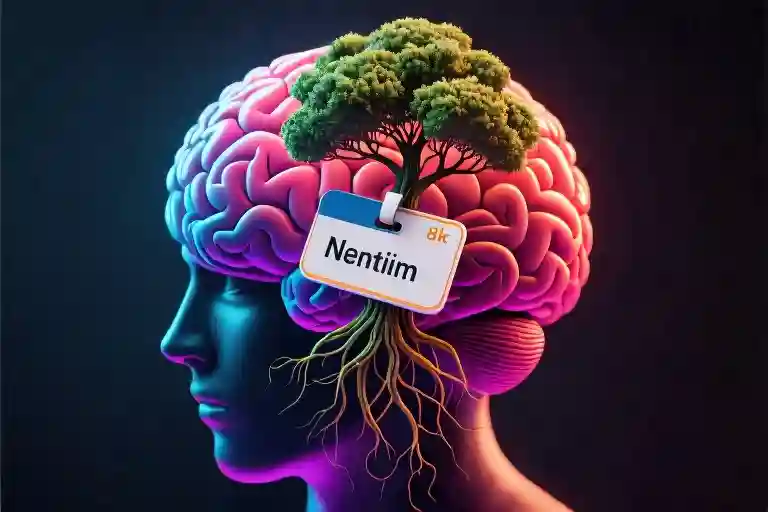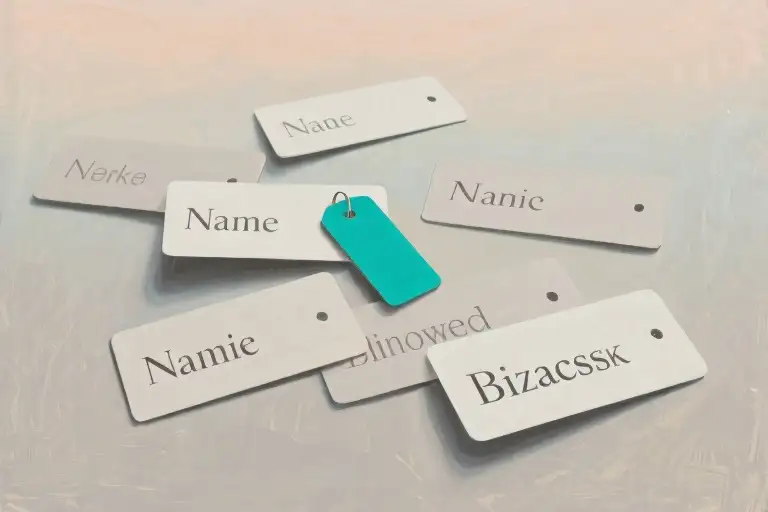The front door creaked open with that familiar sound I hadn’t heard in fifteen months. There they stood – my mother’s sari slightly wrinkled from what I imagined was hours of restless waiting, my sister bouncing on her toes with barely contained excitement. Their smiles hit me first, that particular glow reserved only for family reunions, the kind that makes airport arrival halls magical.
I dropped my bags just in time to catch my sister’s flying hug, my mother’s hands already fussing with my hair like I was still twelve. The scent of cardamom from the kitchen told me she’d made my favorite chai. For a perfect moment, everything felt exactly as it should be after a year and three months away.
Then my mother said the words that nearly made me spit out my first sip of tea: ‘We have an appointment with Panditji tomorrow morning. You’re coming.’
I choked on the milky sweetness, laughter bubbling up at what I assumed was a joke. Until I saw her face – that deadly serious expression I knew from childhood math test disasters. Her fingers tightened around my wrist. ‘Thirty-two years old, no husband, no children. Do you think this is funny?’
The ceramic mug suddenly felt heavy in my hands. This wasn’t just about astrology – it was about every aunty’s pointed questions at weddings, every cousin’s baby announcements that made her sigh, fifteen months of accumulated societal pressure waiting to explode now that her wandering daughter was finally home.
Through the kitchen window, I could see our neighbor’s laundry fluttering like surrender flags. Somewhere beyond the courtyard wall, a street vendor called out the price of mangoes. Ordinary sounds of an ordinary Delhi afternoon, while my mother plotted to drag me to a man who claimed to read destinies in planetary alignments.
‘I don’t believe in…’ I began, but she was already walking away, the jingle of her keychain cutting me off mid-sentence. The conversation wasn’t over – just postponed until tomorrow morning’s confrontation with the stars.
The Relentless Astrologer Intervention
The steam from my masala chai curled upward as I tried to process my mother’s words. “Beta, we have an appointment with Panditji tomorrow at eleven,” she announced, adjusting her sari pallu with the determination of a general mobilizing troops. “He predicted your cousin’s Canada visa approval and fixed Neha aunty’s son’s marriage match. Very accurate.”
I set down the teacup before my involuntary laughter caused another near-death experience. “Ma, I design machine learning algorithms for a living. You really think I’ll believe some stranger can map my future based on planetary positions?”
Her face did that thing I call the “Indian Mother Matrix Download” – eyebrows merging with her bindi, lips pressing into a line that somehow simultaneously conveyed disappointment, worry, and impending emotional blackmail. “Thirty-two years old. No husband. No grandchildren. Do you know what the neighbors say?”
Ah yes, the legendary Neighborhood Committee of Unsolicited Opinions. I could already hear their synchronized tutting through our walls. In the fifteen months I’d been building AI models in Singapore, their collective concern about my uterus had apparently reached DEFCON levels.
“What they say is irrelevant,” I countered, reaching for the last samosa. “My startup’s valuation just hit—”
“—Numbers on paper won’t keep you warm at night!” Ma interrupted, deploying her signature guilt trifecta: dramatic sigh, meaningful glance at family photos, and sudden interest in my hypothetical future loneliness. “Just one consultation. For my peace of mind.”
I recognized this tone – the same one that got me through eight years of Carnatic violin lessons despite having the musicality of a tone-deaf buffalo. Resistance, as they say, was futile.
That’s when the idea struck me. If reason wouldn’t work, perhaps demonstration would. With my data science background, exposing astrological inconsistencies would be simpler than explaining blockchain to my Punjabi relatives. I leaned forward. “Fine. But I get to ask Panditji three questions of my choosing.”
Ma’s victorious smile outshone our Diwali lights. Little did she know, her obedient daughter had just initiated Operation Debunk This Nonsense. The game was on.
The Astrologer and Indian Society’s Unshakable Faith
The steam from my chai cup curled into the air as my mother leaned forward, her eyes urgent with a conviction I hadn’t seen since she’d battled the local grocer over spoiled lentils. “Your cousin Meena consulted Panditji before her engagement,” she said, tapping the newspaper clipping about the astrologer’s ‘miraculous predictions’ that had been circulating our family WhatsApp group for weeks. “Three months later, her husband got promoted. Coincidence?”
This wasn’t just my mother’s eccentricity—it was India’s open secret. From matrimonial ads specifying ‘Mangliks need not apply’ to CEOs scheduling mergers during auspicious muhurats, astrology permeates every major life decision here. My own sister’s wedding date had been shifted twice because some star-obsessed uncle found ‘planetary afflictions’ in the original dates. The pandit who’d finally approved the third date became our family’s WhatsApp display picture for six months.
“Remember when Didi’s mother-in-law demanded a second horoscope matching?” My sister chimed in, referring to the time we’d paid five different astrologers until one produced a compatible chart. The memory made my temples throb—not because of the absurdity, but because I’d been the one secretly bribing the fifth astrologer after the fourth declared my sister ‘cursed by Saturn.’
What fascinates me isn’t the practice itself, but its bulletproof cultural armor. Last year alone, India’s astrology app market grew 62%, with working professionals constituting 40% of users. The same IT engineer who scoffs at pyramid schemes will postpone a job offer because Mars is retrograde. My college roommate—a Stanford-educated data scientist—still carries a ‘yantra’ in her purse to ward off ‘evil eye.’
As my mother unfolded a decade-old notebook filled with astrologers’ phone numbers (color-coded by success rate), I realized this wasn’t about stars—it was about control. In a society where women’s choices are still policed, astrology provides socially acceptable scaffolding for decisions. No one questions a mother insisting her daughter wait until Jupiter aligns, but eyebrows raise at ‘I’m not ready for marriage.’
The notebook’s pages whispered stories: the astrologer who’d ‘guaranteed’ a male grandchild (his fee tripled for gender-specific blessings), the one who’d prescribed gold rings to ‘cure’ my cousin’s depression, the celebrity-endorsed guru now under investigation for extracting diamonds as ‘planetary remedies.’ Yet here was my rational, tax-paying mother treating these pages like sacred text.
“This new pandit specializes in late marriages,” she said, circling an ad with the enthusiasm of a day trader spotting a winning stock. The phrase made me flinch—as if my life were a problem needing specialist intervention. In that moment, I understood my battle wasn’t against one fraudulent stargazer, but against the industrial complex that had my mother convinced her daughter’s worth could be decoded from planetary positions.
Outside, a street astrologer called to crows he claimed were ‘Shani’s messengers.’ I watched my mother leave coins in his bowl—a small price for cosmic reassurance. Her faith wasn’t foolishness; it was the language of love in a world that taught her the stars knew her child better than she did.
The Reckoning Plan
The chai stain on my kurta had barely dried when I started plotting. If my mother wanted to play the astrology game, I’d play it better. This wasn’t just about refusing—it was about exposing the elaborate con that had generations of Indians clutching their birth charts like sacred texts.
That evening, I called my college friend Riya, now a data journalist who’d written about pseudoscience. ‘You won’t believe what Amma sprung on me today,’ I said, watching ceiling fan shadows dance across my childhood bedroom walls. Her laughter crackled through the phone. ‘Classic Delhi mom move. But listen—we can turn this into a sting operation.’
Over the next 48 hours, we became amateur investigators. The astrologer, a certain Pandit Joshi with a TV show and 200K Instagram followers, had skeletons rattling in his celestial closet. Forum threads detailed how he’d predicted a politician’s victory (‘certain as the sun rises’) weeks before the man died of cardiac arrest. His ‘personalized’ horoscopes for three different clients contained identical paragraphs. Best of all? He’d been sued last year by a Mumbai businessman for charging ₹50,000 to ‘neutralize Saturn’s effects’—with a ruby that turned out to be colored glass.
Riya helped me craft test questions designed to trip him up. ‘Give him a fake birth time off by 15 minutes from your real one,’ she suggested. ‘If he’s legit, the nakshatra should change—but these guys just regurgitate whatever you tell them.’ We even rehearsed: she played Joshi, spewing vague threats about ‘planetary afflictions,’ while I practiced countering with, ‘Funny, because according to NASA, Saturn’s moons don’t actually—’
My notebook filled with contradictions. Page after page of his public predictions versus reality—failed monsoon forecasts, Bollywood couples he’d declared ‘cosmically perfect’ before their messy divorces. The smoking gun came via an old interview where he claimed Gemini risings should avoid travel in 2019; that same year, he’d blessed a Gemini client’s international business expansion for a hefty fee.
As I compiled evidence, I realized this wasn’t just about one fraudster. The entire Indian astrology industry thrives on manufactured urgency—the same fear my mother felt about my unmarried status. These ‘experts’ peddle solutions to problems they invent, like spiritual snake oil salesmen. My favorite discovery? Joshi’s website had a disclaimer in microscopic font: ‘Predictions may vary based on individual interpretation.’
The night before our appointment, I arranged printouts in a folder like legal briefs. My stomach fluttered—not with nervousness, but the giddy anticipation of watching a house of cards collapse. Whether my mother would accept the truth remained uncertain, but for the first time in years, I felt prepared to bridge our divide with facts rather than frustration. The planets, it seemed, had aligned for reckoning.
The Showdown at the Astrologer’s Den
The waiting room smelled like stale incense and desperation. Gold-framed certificates proclaiming the astrologer’s ‘divine gifts’ lined the walls, each more elaborate than the last. My mother sat stiffly beside me, her sari rustling with nervous energy as she rehearsed her questions under her breath. I tightened my grip on the folder in my lap – my secret arsenal of printouts showing this same ‘revered pandit’ had given contradictory predictions to three different clients last month.
When the beaded curtain parted, the man who emerged looked nothing like the mystical sage I’d expected. His polyester shirt strained over a paunch, and the ‘sacred’ red thread around his wrist looked suspiciously like something from a tourist shop. Yet his voice dripped with honeyed authority as he gestured us forward. ‘Come, child. The stars have been waiting to speak about your delayed marriage.’
I nearly snorted at his opening gambit – the oldest trick in the Indian astrology scam handbook. Before my mother could respond, I leaned forward. ‘How fascinating! Could you first explain why your prediction for Mrs. Kapoor’s daughter changed after she paid for the ‘special remedy’ last year?’ His eyelid twitched as I slid the first document across the glass-topped table – a forum post from the woman’s cousin detailing the exact monetary amounts demanded at each stage.
What followed was twenty minutes of beautiful chaos. Each time the astrologer launched into vague pronouncements about ‘planetary alignments,’ I countered with dated records of his failed predictions. When he claimed I had ‘negative energy,’ I produced screenshots showing he’d used identical phrasing for six other unmarried clients. My mother’s initial protests (‘Beta, don’t disrespect!’) faded as the evidence mounted, her fingers slowly unclenching from the edge of her dupatta.
The final blow came when I played my trump card – a recording from a friend who’d visited earlier with a fictional birth chart. The astrologer’s voice rang out confidently declaring her ‘fortunate marriage before 25,’ unaware she’d invented the date. The color drained from his face as my mother finally turned to him, her voice quiet but steel-edged: ‘You told my neighbor her son would clear UPSC exams. He failed twice.’
Silence thickened the air as we stepped into the sunlight. My mother didn’t speak until we reached the auto-rickshaw stand, her profile unreadable. Then, with the ghost of a smile: ‘Next time… maybe we just go for golgappas instead.’ It wasn’t total surrender – I could still see the worry lines between her brows – but for the first time, I sensed a crack in her belief. Some battles aren’t won with facts alone, but with the patient unraveling of a lifetime of cultural conditioning, one thread at a time.
When Stars Collide With Reality
The astrologer’s cramped office smelled of sandalwood incense and desperation. As my mother eagerly leaned forward to hear his predictions about my marital prospects, I watched his eyes dart between my designer handbag and the gold bangles on my wrist—calculating how much he could charge for this ‘consultation.’ When he finally spoke, his voice dripped with the practiced gravitas of someone who’d delivered the same generic lines to hundreds of anxious parents.
“Your daughter has Mangal dosha,” he declared, tapping my birth chart like a prosecutor presenting damning evidence. “This planetary combination explains why she resists marriage. But for 21,000 rupees, I can perform special pujas to—”
That’s when I slid my tablet across the table, screen displaying a news article about his fraud conviction in Pune. The room went so quiet I could hear my mother’s bangles trembling.
The Silence After the Storm
My mother didn’t speak during the entire autorickshaw ride home. Not when the driver nearly hit a cow, not when my phone buzzed with messages from friends asking how the ‘sting operation’ went. She just kept staring at the crumpled receipt from the astrologer—the one he’d hastily printed before we left, still insisting his remedies could work if we paid upfront.
That night, I found her sitting cross-legged on the prayer rug, not chanting mantras but scrolling through the folder of evidence I’d compiled: screenshots of the astrologer giving contradictory predictions to different clients, financial records showing his sudden property purchases after ‘fortunate’ clients donated large sums. The kicker? His own daughter, I discovered, was studying astrophysics in California and had publicly denounced astrology on Quora.
“Maybe stars don’t decide everything,” she finally said, handing me back the tablet. There was no dramatic conversion to rationalism, just the quiet unraveling of something that had seemed unshakable an hour earlier.
Between Two Worlds
Walking through our neighborhood the next morning, I noticed new details in familiar sights—the temple priest who doubled as a math tutor, the jewelry shop owner whose daughter ran an AI startup. India has always lived in simultaneous centuries, but I’d never appreciated how exhausting that balancing act must be for our parents’ generation. They’re expected to venerate traditions while preparing their children to compete in a world those traditions never anticipated.
My mother still lights diyas every evening. She still won’t start important tasks on ‘inauspicious’ days. But last week, when Auntie Menon came boasting about her son-in-law’s astrologer-approved promotion, I heard my mother murmur, “Or maybe he’s just good at his job?” Progress comes in whispers sometimes.
What surprised me most wasn’t debunking the astrologer—that was easy. It was realizing how much courage it takes for someone to question beliefs they’ve used as compass points their whole life. My mother may never file astrology under ‘scams’ alongside phishing emails, but she’s started asking questions instead of just accepting answers. In a culture that treats doubt as disrespect, that’s its own kind of revolution.
So here’s what I’ve learned: You don’t have to choose between loving your heritage and challenging its problematic parts. The real magic happens in that uncomfortable, luminous space where tradition and truth collide—where a daughter’s research meets a mother’s willingness to reconsider. That’s where the future gets written, no horoscope required.





